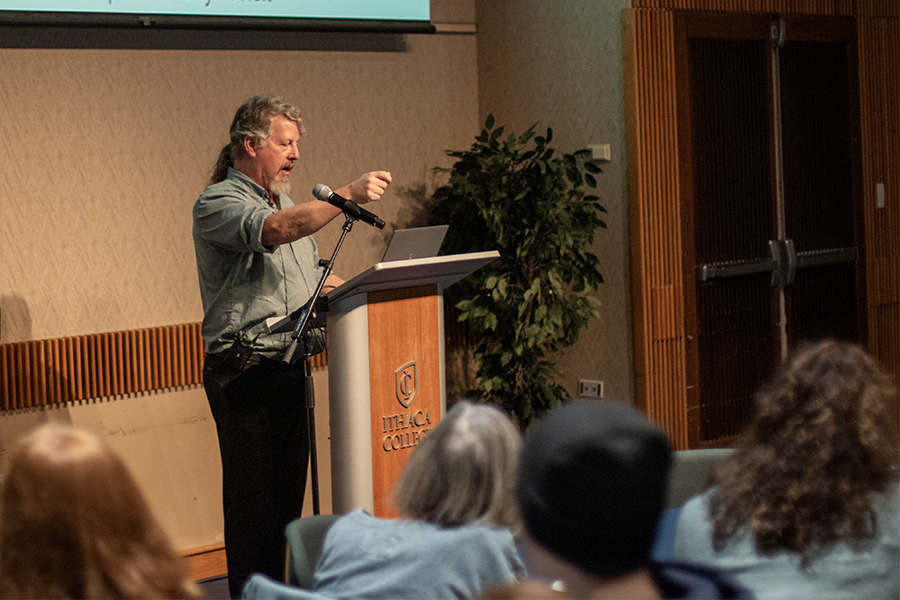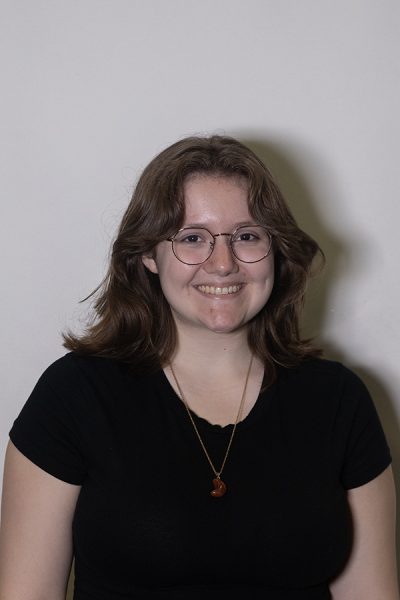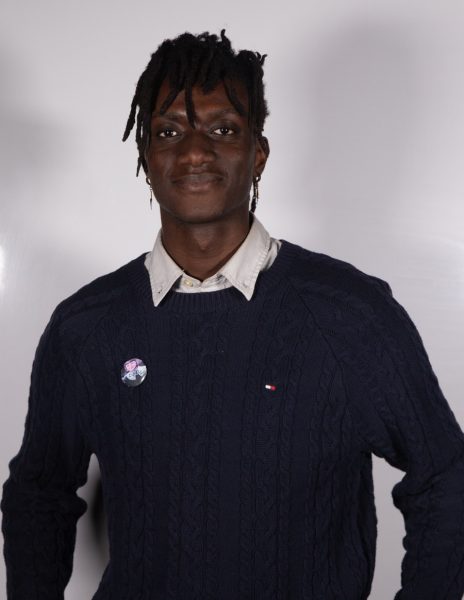On Nov. 9, Ithaca College’s Center for the Study of Culture, Race, and Ethnicity and the Center for Equity, Inclusion, and Belonging welcomed Kurt Jordan, professor of anthropology at Cornell University and director of Cornell’s American Indian and Indigenous Studies Program, to lead a community discussion about his book, “The Gayogo̱hó꞉nǫɁ People in the Cayuga Lake Region.”
Jordan’s book, which was published in 2022, serves as a brief history of the Gayogo̱hó꞉nǫɁ people, beginning at the end of the last ice age and ending in 2021.
The event was opened by Belisa Gonzalez, dean of faculty, equity, inclusion, and belonging, who began by giving thanks to those who helped make the event possible, including the Council of Independent Colleges, who supplied the grant that helped fund the event. Gonzalez also read and addressed IC’s land acknowledgment.
“While it was painful and perhaps embarrassing to admit, where most of us are is in a state of ignorance about the place we reside and some of us call home,” Gonzalez said. “We decided that instead of asking the Gayogo̱hó꞉nǫɁ to teach us, as we so often do to minoritized communities, we could do what we could to learn in community with others. And that is what led us here tonight.”
Jordan’s presentation opened with his own thoughts on land acknowledgments and whether they are helpful or harmful. He stressed the importance and effectiveness of what he referred to as living land acknowledgments, which address not only the long history indigenous peoples have with the land being acknowledged, but their contemporary presence and future in it as well. He also spoke about Cornell’s land acknowledgment.
“When Cornell adopted [the acknowledgment] as an institution, it made no commitments to the Gayogo̱hó꞉nǫɁ, and it hasn’t made any since then, and it’s been fifteen months or so since this has been adopted,” Jordan said. “So I think that’s an issue, and I encourage Ithaca College, the Eight Square Schoolhouse, whoever else is considering a land acknowledgment, to do things a bit differently.”
These complexities, many of which Jordan attributes to colonialism, ranged from discussion about how long the Gayogo̱hó꞉nǫɁ people have been living in Tompkins County since at least 13,000 years ago, to the expeditions and negotiations that led to the Gayogo̱hó꞉nǫɁ being pushed out of this land, to how the Gayogo̱hó꞉nǫɁ began to reestablish themselves in their homeland in 2003.
Jordan also talked about recent and ongoing disputes between two groups, the traditional Gayogo̱hó꞉nǫɁ government and the Cayuga Nation of New York, that have been impairing efforts for resettlement.
The traditional Gayogo̱hó꞉nǫɁ government, which Jordan said has existed for anywhere from 500 to 1,000 years, recognizes a wide variety of people as Gayogo̱hó꞉nǫɁ.
“You can be Gayogo̱hó꞉nǫɁ if your mother was Gayogo̱hó꞉nǫɁ, regardless of where you live,” Jordan said. “If you live in Seneca Falls, if you live in Tokyo, if you live in Lima, Peru, and your mother was Gayogo̱hó꞉nǫɁ, you are considered to be Gayogo̱hó꞉nǫɁ by the traditional government.”
In contrast, the Cayuga Nation of New York only recognizes residents of New York state as Gayogo̱hó꞉nǫɁ, and Jordan said it also has a more Western style of government that focuses on business creation and expansion. Although the two groups were able to coexist peacefully for many years, Jordan says they came to a violent head in February 2020 when the Cayuga Nation of New York used heavy machinery to knock down a complex of buildings where traditional people were living and working. In his presentation, Jordan showed before and after images of the destroyed buildings.
“That is the culture building, where language and ceremony were taught,” Jordan said. “They also destroyed the garden that was outside the building, and they knocked down a daycare center.”
In March 2023, the Bureau of Indian Affairs approved the accumulation of the Cayuga Nation of New York’s land-into-trust petition. Jordan said this ended roughly 216 years of landlessness for the Gayogo̱hó꞉nǫɁ people by creating a formal reservation of 101 acres in the Union Springs area.
“One might think that this would be a moment of sunshine and rainbows, but we have to note that this was done for the Cayuga Nation of New York,” Jordan said. “And I think that it has strengthened their position rather dramatically.”
Jordan ended his presentation by talking about some current efforts by Gayogo̱hó꞉nǫɁ traditionalists to bring more awareness to their presence in the Cayuga Lake Region. This included the Gayogo̱hó꞉nǫɁ Learning Project, which is based in Ithaca and aims to teach the Gayogo̱hó꞉nǫɁ language to members of the Gayogo̱hó꞉nǫɁ diaspora through online classes.
Mika Kennedy, assistant professor in the Center for Study of Culture, Race and Ethnicity and one of the organizers of the event, closed out the event by saying that she hopes attendees will think about what they have learned when going about their daily lives in Ithaca.
“The final thing I would like to leave you with is an invitation to think about the way that you might bring some of what you’ve learned today into your lived practice right now,” Kennedy said. “And I’d like you to think about how the information that you’ve learned tonight might restructure or ask you to re-envision the means by which you are navigating this space, the things that you think about as you move through this space and the things that are left for you to do.”










